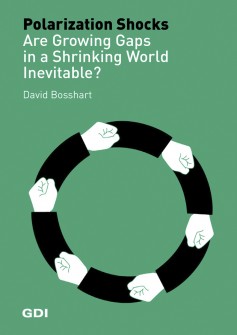Was mich antreibt sind nicht Befürchtungen, sondern die Frage, warum wir mit so viel Wissen so wenig erreichen. Wir sind Wissensgiganten und Umsetzungszwerge. Wir verdrängen, vergessen, verschieben. Die grossen Trends – Globalisierung, Digitalisierung, das Ungleichgewicht von Kapital und Arbeit, Populismus – sind langfristig und gehen über Jahrzehnte. Genauso ist es mit Pandemien. Die Infektionskrankheiten, die von Tieren übertragen werden, haben an Häufigkeit und Intensität kontinuierlich zugenommen. Wir wissen das alles. Die Bedeutung von Kapital – Plattformkapitalismus, neuartige Monopole – vs. die Bedeutung von Arbeit hat sich seit der Finanzialisierung der Wirtschaft, der Assetisierung des Lebens («Verwerte und monetarisiere all deine geistigen, emotionalen und körperlichen Potenziale») ebenfalls verstärkt. Digitale Geschäftsmodelle verleiten zu viel riskanterem Handeln und treiben Führungsentscheide ins Extrem, ebenso die Einkommens- und Vermögenssituationen. Wir reagieren darauf rational mit noch mehr Spezialisierung und Expertentum. Und irrational mit Populismus. Bei allen dreien fehlen im Endeffekt gemeinsame Realitäten.
Zunächst: Das Thema Klassengesellschaft ist darum so wichtig, weil die ökonomischen Voraussetzungen für die Menschen in den Wohlstandsgesellschaften immer noch die entscheidende Rolle spielen. Frieden kann man zu hohem Masse mit geteiltem Wohlstand erkaufen. Darum Wachstumszwang, darum das Festklammern am BIP-Wachstum als Hoffnungsschimmer. Die alte Dialektik von Arbeitgeber bzw. Kapitaleigner und Angestellte bzw. Arbeiter hat in der industriellen Welt klare gegenseitige Abhängigkeiten definiert: Man wusste, dass man auf die gegenseitige Leistung angewiesen war, um sich weiterentwickeln zu können. Und mit dem Ausbau des Sozialstaates war die Machtbalance hinzukriegen. Mit Globalisierung, Digitalisierung, Finanzialisierung geht das aber nicht mehr auf. Heute gehen die Gewinner der Digitalisierung, der Monopolisierung der Plattformen und der Finanzindustrie davon aus, dass sie sich durchsetzen werden. Aktuell scheint mir, verzetteln wir unsere Energie mit einem zu starken Fokus auf kulturelle Minderheiten und vergessen dadurch, dass es letztlich um ökonomische Macht geht. Ohne sie bleibt keine politische Macht durchsetzungsfähig. Covid-19 zeigt, wie sehr die Gesellschaft in religiöse, esoterische, aber auch wissenschaftsgläubige Gruppierungen gespalten ist – fluide Meinungen ohne wirkliche, praktische Mehrheitsfähigkeit. Beruhigend ist das alles nicht. Religiöse Staaten sind die besten Fallstudien dafür. Der Dollar ist stärker als Allah oder Buddha. In der Hinsicht ist Marx immer noch hochaktuell. Wir werden uns auch noch in zehn Jahren über unsere Arbeit definieren. Und die soll ordentlich wertgeschätzt und entlohnt werden.
Menschen sind tätige Wesen, sie wollen gebraucht werden und dafür Anerkennung bekommen. Und nicht hören, dass sie «deplorables» – Bemittleidenswerte – oder «loser» seien. Denn solche Geringschätzung zerstört den sozialen Kitt im Kern. Die Covid-19-Krise zeigt ja gerade sehr schön, was «systemrelevant» ist. Ein Grund für die Polarisierung ist die extreme Verkürzung der – vermeintlich gefragten – Skills auf einige wenige vorwiegend kognitive Fähigkeiten. Wir sprechen daher nicht zu unrecht vom «kognitiven Kapitalismus». Dabei ginge es um eine ganzheitliche Betrachtung von Hand, Herz und Haupt. Weil die Trennung von «high skilled» und «low skilled» (oder gar «no skilled») zunimmt, sind wir in die Welt der sogenannten «Degreeization» eingetreten: Junge Menschen haben ab sofort den Druck, noch mehr und noch wichtigere Diplome abzuschliessen, um im Kampf um Status und Anerkennung einen gut bezahlten Job zu bekommen. Nirgendwo ist der Ellbogenkampf um Ratings und Rankings grösser als in der sogenannten «Höheren Bildung». Lebenstauglicher und konsensfähiger hat uns diese Entwicklung nicht gemacht, wir sind eher so etwas wie hochgezüchtete Ratten geworden. Die USA haben zwar immer noch die höchste Anzahl von Top-Universitäten, aber die sind unglaublich teuer geworden, so dass man nur mit entsprechendem Kapital und Beziehungen Eintritt gewinnt. Ein Harvard-Abschluss ist heute ein Luxus-Accessoire, eine Art Louis-Vuitton-Tasche der Bildung.
Die Frage ist, was wir alle wenigstens präventiv lernen für die Zukunft. Was können wir tun, um solche Ereignisse zumindest erträglicher zu gestalten? Ganz verhindern können wir sie nicht, vor allem nicht in freiheitlichen Systemen. China hat es einfacher, weil Tracing und Tracking politisch möglich sind und von einem sehr grossen Teil der Bevölkerung getragen werden. Putin hat vor drei Jahren gesagt, wer Künstliche Intelligenz beherrsche, beherrsche die Welt. So spricht, wer über zentrale Steuerung Herrschaft ausüben will, denn Künstliche Intelligenz zentralisiert. Wir müssen schauen, dass wir mit Hintergrundtechnologie – warum nicht Blockchain? – die Sicherheit für Bürger und Konsumenten kontinuierlich verbessern. Prävention ist das Stichwort.

Wie Covid und Digitalisierung den Wandel beschleunigen

Broschur, 2017
Sprache: Englisch
Illustrationen und Layout: Yang Liu Design
Seiten: 30
Die Corona-Krise wird zum Katalysator für neue Anbauformen wie Urban Farming und Fleisch aus Zellkulturen. Noch fehlt für vieles aber die technische Infrastruktur. Im Interview mit der «Lebensmittel Zeitung» verdeutlicht David Bosshart, wie Covid-19 die Ernährung verändert hat.
Jakub Samochowiec: «Die Zukunft soll uns nicht einfach nur zustossen»
Was müssen wir für die Zukunft können? GDI-Forscher Jakub Samochowiec stellt im Podcast des Eidgenössischen Hochschulinstituts für Berufsbildung die Ergebnisse der Studie «Future Skills» vor.